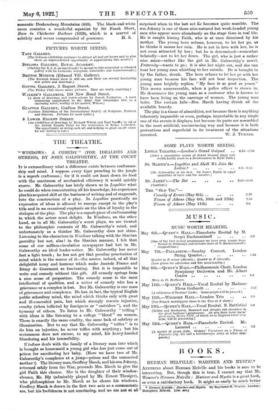THE THEATRE.
-"WINDOWS : A •COMEDY " (FOR IDEALISTS AND OTHERS), BY JOHN GALSWORTHY, AT THE COURT THEATRE.
IT is extraordinary what a difference exists between craftsman- ship and mind. I suppose every tiger prowling in the jungle is-a superb craftsman ; for if it could not hunt down its food with the -maximum of mechanical efficiency it would quickly starve. Mr. Galsworthy has lately shown us -in Loyalties what he coulddo when concentrating all his knowledge, his experience plushis acquired skill at the business of writing and of stagecraft, into -the construction of a play. In Loyalties practically no expression of ideas is allowed to emerge except in the play's title and in an occasional emphasis on the idea of loyalty in the dialogue of the play. The play is a superb piece of craftsmanship in which the actors must delight. In Windows, on the other band, as •in all Mr. Galsworthy's worst plays, we are treated to the philosophic contents of Mr. Galsworthy's mind, and unfortunately as a thinker Mr. Galsworthy does not shine. Listening to the characters in Windows talking with the Shavian garrulity but not, alas ! in the Shavian manner, I felt that some of our million-circulation newspapers had lost in Mr. Galsworthy an ideal leader-writer. Mr. Galsworthy has never had a light touch ; he has not got that peculiar penetration of mind -which is the source of it—the source, indeed, of all that delightful irony and -humour which -make Anatole France and Rimy do 'Gourmont so fascinating. But •it is impossible .to write real comedy without this gift. All comedy springs from a nice sense of •proportion. The comedy sense is the most intellectual of qualities, and a writer of comedy who has a grievance or a complex is lost. But Mr. Galsworthy is one mass of grievances and complexes. He has, in feet, the typical English public •schoolboy mind, the mind which thinks only with great and ill-concealed pain, but which strongly resents injustice, cruelty (when inflicted by foreigners or " outsiders "), and the tyranny of others. To listen to Mr. Galsworthy " trifling" with ideas is like listening to a college " blood " on women. There is exactly -the same crudity, the same lack of subtlety or illumination. But to say that Mr. Galsworthy "trifles " •is to do him an injustice, he never 'trifles with anything ; but his seriousness does not excuse, to my mind, his heavy-handed blundering and his insensibility.
Windows deals with the family of a literary man into which is brought as housemaid a young girl who has just come out of prison for smothering her baby. (Here we have two of Mr. Galsworthy's complexes at a jump—prison and the unmarried mother !) The literary man, Geoffrey March, and his son Johnny, returned safely from tho War, persuade Mrs. March to give the girl Faith this chance. She is the daughter of their window- cleaner, Mr. Ely (admirably played by Mr. Ernest Thesiger), Who philosophizes to Mr. March as he cleans his windows. Ceoffroy -March is drawn-in the first two -acts as a consummate ass, 'but his 'foolishness is not convincing, and we US not at all
surprised when in the last act he becomes quite sensible. The son Johnny is one of those nice-natured but weak-headed young men who appear more abundantly on the stage than in real life. He is caught kissing Faith, who is at once dismissed by his mother. The young hero refuses, however, to let her go, as he thinks it means her ruin. He is not in love with her, ho is not even attracted by her.; but he is determined—somewhat belatedly—not to let her down. The girl, who is just a rather nice minx—rather like the girl in Mr. Galsworthy's novel, Fraternity—wants to go ; it is also her night out, and she can hear her young man whistling to her outside. He is brought in by 'the father, drunk. The hero refuses to let her go with her young man because his face will not bear inspeCtion. The young man brightly replies, " My face is as good as yours." This seems unanswerable, when a police officer is shown in. He denounces the young man as a souteneur who is known to have been living on the earnings of women. The young man bolts. The curtain falls--Mrs. March having drunk all the available brandy.
The play is a tissue of absurdities, not because there is anything inherently impossible or even, perhaps, improbable in any single one of the events it displays, but because its parts are assembled in the most artificial, unconvincing way and because it is both pretentious and superficial in its treatment of the situations


































 Previous page
Previous page